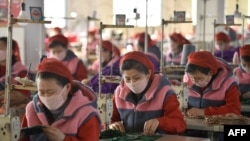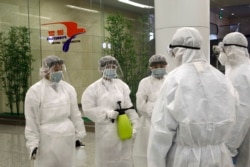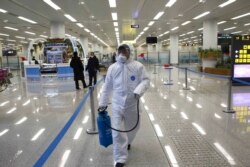North Korea is able to conduct tests for the new coronavirus, but still has not reported any infections, the World Health Organization told VOA Friday, amid international concerns that Pyongyang is not properly equipped to handle a possible outbreak.
North Korea has cut off virtually all links to the outside world in response to the highly contagious virus, which has killed nearly 1,400 people and infected more than 60,000 —almost all in next-door China. Calling the efforts a matter of "national survival," North Korea has banned foreign tourists, halted flights and train services with its neighbors, and implemented a 30-day quarantine for all arriving foreigners.
Citing figures from North Korea's Ministry of Public Health, the WHO told VOA that 141 travelers entering North Korea have tested negative for the virus, after showing signs of fever. That is out of a group of "as many as 7,281 travelers" that entered the country between Dec. 30, 2019, and Feb. 9, 2020, according to the North Korean figures.
"The Democratic People's Republic of Korea has the capacity to carry out these tests as they have PCR machines, and their laboratory technicians and experts were trained by WHO in influenza testing in a Hong Kong laboratory last year," said Dr. Edwin Ceniza Salvador, the WHO Representative to North Korea.
The WHO says it is providing North Korea with laboratory testing agents and personal protective equipment including goggles, gloves, masks and gowns, at the request of North Korea.
The statement did not specify if those already residing in North Korea had been tested. Several South Korea-based media have published unconfirmed reports the virus already has reached the North.
There are concerns North Korea is uniquely unprepared for an outbreak of the virus, which causes a pneumonia-like illness that was recently named COVID-19.
The U.S. State Department said Thursday it is "deeply concerned" about North Koreans' vulnerability to the virus and is prepared to "expeditiously facilitate" efforts by international aid groups to provide help.
North Korea is under international sanctions because of its nuclear weapons program. The sanctions prohibit a wide range of cooperation with the North, meaning aid groups wanting to help must first obtain exemptions.
The U.N. committee that handles those exemptions told VOA's Korean Service earlier this week it will consider those requests "as expeditiously as possible."
The International Federation of Red Cross and Red Crescent Societies said this week they are seeking an urgent sanctions exemption to provide "life-saving intervention," including more coronavirus testing kits and personal protective gear.
Delay possible
But the aid may not begin flowing right away, since the U.N. exemptions process is cumbersome, says Kee Park, a faculty member at Harvard Medical School.
Instead, Park says the U.N. should proactively offer a special waiver that would allow aid groups to procure and send emergency supplies to North Korea as soon as possible.
"When facing a potential public health emergency, asking for permission to deliver medical supplies is absurd," says Park, who frequently participates in medical exchange trips to North Korea.
Daniel Wertz, a program manager at the Washington-based National Committee on North Korea, agrees the exemptions process can be "complex" and "time-consuming."
But Wertz says it is sensible that Washington seems to be treating the issue separately from the issue of stalled nuclear negotiations.
"Supporting the lives and health of the North Korean people is a worthwhile objective in itself," Wertz says.
Not transparent?
But the extent to which North Korea has invited outside aid groups to help combat the virus is not clear.
Choi Jung-hoon, a former North Korean medical doctor who defected to the South in 2012, told VOA's Korean Service that he thinks Pyongyang may try to conceal any possible infections rather than seek help from international aid groups.
"Because North Korea tries to put up an image of having the best 'self-sufficient' medical science to treat and prevent infectious diseases through propaganda, the regime is reluctant to announce any outbreak publicly," he said.
Choi, now a research professor at Korea University's Public Policy Research Institute in Seoul, says North Korea is unequipped to handle a serious outbreak.
"When there is an outbreak of an infectious disease in North Korea, only Pyongyang is completely protected [quarantined]," said Choi.
"North Korea's medical system is poor, as the world probably knows," he added. "It does not have proper medical equipment, let alone reliable electricity or water supply facilities in hospitals and health centers."







